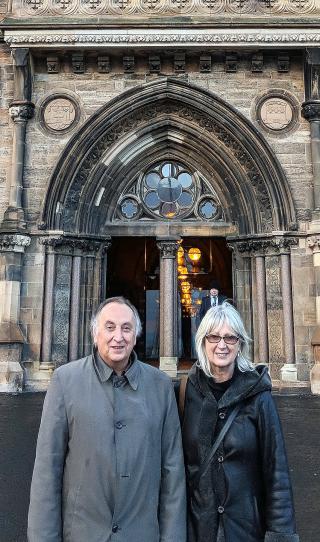The Strengthening Urban Engagement of Universities in Asia and Africa (SUEUAA) project team were delighted to welcome Professor Caroline Knowles, Programme Director of the British Academy’s Cities and Infrastructure Programme, this week for a meeting in the School of Education at the University of Glasgow. This year, the British Academy’s Global Challenge Research Fund (Cities and Infrastructure) funded 17 projects across the UK, all of which looking at aspects of how to create and maintain sustainable and resilient cities in developing countries, of which SUEUAA is one*.
The meeting took place on the 24th of January, and the SUEUAA team provided an update on our progress to date, with Dr Lavinia Hirsu, Dr Neil Burnside, and Dr Muir Houston providing a summary of their thematic papers on policy, the environment, and the economy of the six cities. During discussions we highlighted the important leading role our international partners were taking in fieldwork and driving the agenda of the SUEUAA project.
The team will be travelling to London on 19th of February to meet with the other BA funded projects for a two day event. The first day will be an opportunity for all funded projects to provide an overview of their work; the second will be a conference on the subject of “thinking creatively through urban infrastructure”. Two blogs detailing the lessons learned from these events will be posted on this site afterwards.
The Strengthening Urban Engagement of Universities in Asia and Africa (SUEUAA) project is funded by the British Academy under the Cities and Infrastructure programme of its Global Challenges Research Fund. The project, led by the University of Glasgow, includes six international partners from Iran, Iraq, the Philippines, South Africa, Tanzania and Zimbabwe.
The project addresses a core problem in emerging economies of strengthening the urban engagement role of universities, and ways they contribute to developing sustainable cities in the context of the major social, cultural, environmental and economic challenges facing the global south. It uses a set of well-proven benchmarking tools as its principal method, and seeks to strengthen the capacity of universities to contribute to city resilience towards natural and human-made disasters. Examples of urban engagement include supporting the development of physical infrastructure, ecological sustainability, and social inclusion (including of migrants). It calls upon contributions from science and engineering, the arts, environmental sciences, social sciences and business studies. It assesses the extent to which universities in 6 countries under study can respond to demands of society, and how through dialogue with city stakeholders this can be enhanced and impact on policy; it uses a collaborative team from the UK and emerging economies.
best Running shoes brand | Women's Nike nike dunk high lace length hair color trainers - Latest Releases , IetpDiscussion topics:
- Log in to post comments














Latest Comments